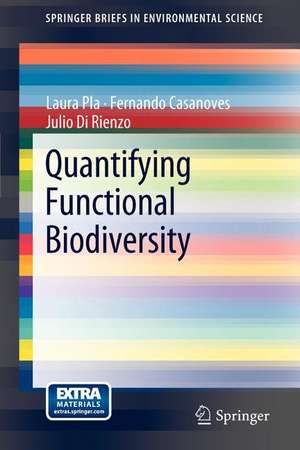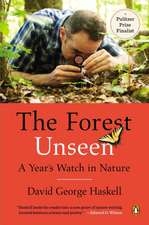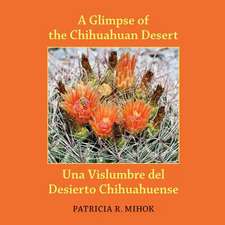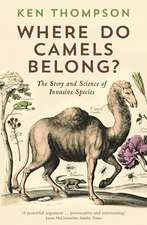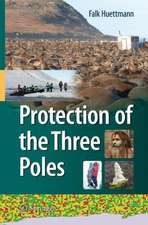Quantifying Functional Biodiversity: SpringerBriefs in Environmental Science
Autor Laura Pla, Fernando Casanoves, Julio Di Rienzoen Limba Engleză Paperback – 31 oct 2011
Din seria SpringerBriefs in Environmental Science
-
 Preț: 348.77 lei
Preț: 348.77 lei -
 Preț: 382.57 lei
Preț: 382.57 lei -
 Preț: 378.12 lei
Preț: 378.12 lei -
 Preț: 378.80 lei
Preț: 378.80 lei -
 Preț: 381.98 lei
Preț: 381.98 lei -
 Preț: 347.80 lei
Preț: 347.80 lei - 15%
 Preț: 464.18 lei
Preț: 464.18 lei -
 Preț: 378.12 lei
Preț: 378.12 lei -
 Preț: 377.53 lei
Preț: 377.53 lei -
 Preț: 379.09 lei
Preț: 379.09 lei -
 Preț: 381.00 lei
Preț: 381.00 lei -
 Preț: 383.93 lei
Preț: 383.93 lei -
 Preț: 175.58 lei
Preț: 175.58 lei -
 Preț: 475.83 lei
Preț: 475.83 lei -
 Preț: 380.07 lei
Preț: 380.07 lei -
 Preț: 378.92 lei
Preț: 378.92 lei -
 Preț: 411.93 lei
Preț: 411.93 lei -
 Preț: 375.62 lei
Preț: 375.62 lei -
 Preț: 375.45 lei
Preț: 375.45 lei -
 Preț: 378.92 lei
Preț: 378.92 lei -
 Preț: 377.57 lei
Preț: 377.57 lei -
 Preț: 377.35 lei
Preț: 377.35 lei -
 Preț: 378.34 lei
Preț: 378.34 lei -
 Preț: 344.67 lei
Preț: 344.67 lei -
 Preț: 374.30 lei
Preț: 374.30 lei -
 Preț: 362.43 lei
Preț: 362.43 lei -
 Preț: 446.26 lei
Preț: 446.26 lei - 5%
 Preț: 361.96 lei
Preț: 361.96 lei -
 Preț: 376.43 lei
Preț: 376.43 lei -
 Preț: 380.63 lei
Preț: 380.63 lei -
 Preț: 375.84 lei
Preț: 375.84 lei - 15%
 Preț: 463.20 lei
Preț: 463.20 lei -
 Preț: 383.33 lei
Preț: 383.33 lei -
 Preț: 375.23 lei
Preț: 375.23 lei -
 Preț: 377.57 lei
Preț: 377.57 lei -
 Preț: 381.59 lei
Preț: 381.59 lei -
 Preț: 379.48 lei
Preț: 379.48 lei -
 Preț: 376.04 lei
Preț: 376.04 lei -
 Preț: 413.84 lei
Preț: 413.84 lei -
 Preț: 381.81 lei
Preț: 381.81 lei -
 Preț: 352.28 lei
Preț: 352.28 lei -
 Preț: 381.81 lei
Preț: 381.81 lei -
 Preț: 381.98 lei
Preț: 381.98 lei - 5%
 Preț: 331.65 lei
Preț: 331.65 lei -
 Preț: 375.62 lei
Preț: 375.62 lei -
 Preț: 377.95 lei
Preț: 377.95 lei -
 Preț: 413.45 lei
Preț: 413.45 lei -
 Preț: 267.19 lei
Preț: 267.19 lei -
 Preț: 373.73 lei
Preț: 373.73 lei -
 Preț: 375.62 lei
Preț: 375.62 lei
Preț: 344.64 lei
Nou
Puncte Express: 517
Preț estimativ în valută:
65.97€ • 71.68$ • 55.45£
65.97€ • 71.68$ • 55.45£
Carte tipărită la comandă
Livrare economică 21 aprilie-05 mai
Preluare comenzi: 021 569.72.76
Specificații
ISBN-13: 9789400726475
ISBN-10: 9400726473
Pagini: 110
Ilustrații: IX, 98 p. 35 illus. With online files/update.
Dimensiuni: 155 x 235 x 23 mm
Greutate: 0.18 kg
Ediția:2012
Editura: SPRINGER NETHERLANDS
Colecția Springer
Seria SpringerBriefs in Environmental Science
Locul publicării:Dordrecht, Netherlands
ISBN-10: 9400726473
Pagini: 110
Ilustrații: IX, 98 p. 35 illus. With online files/update.
Dimensiuni: 155 x 235 x 23 mm
Greutate: 0.18 kg
Ediția:2012
Editura: SPRINGER NETHERLANDS
Colecția Springer
Seria SpringerBriefs in Environmental Science
Locul publicării:Dordrecht, Netherlands
Public țintă
ResearchCuprins
1. Introduction.- 1.1 Functional Diversity Approach To Quantify the Biodiversity.- 1.2 Functional Diversity Assessment.- 1.3 Classification of Ecosystem Services.- 1.4 Selection of Traits According to Ecosystem Service.- 1.5. Functional Diversity Quantification.- 2. Functional Groups.- 2.1 Selecting Trait and Its Relation With Ecosystem Services.- 2.2 A Guide For Data Arrangement.- 2.3 Statistical Procedures To Define Functional Groups.- 2.4 Functional Characterization of Coastal Sandy Plain Vegetation in Southeast Brazil.- 2.5 Functional Groups For Bird Species in Nicaragua.- 3. Functional Diversity Indices.- 3.1 About Functional Diversity Indices and Measures.- 3.2 Species Diversity Indices.- 3.3 Single-trait Metrics and Indices: Properties and Estimation.- 3.4 Multi-trait Indices: Properties and Estimation.- 3.5 Ability of Indices to Detect Some Ecological Processes.- 4. How To Estimate Functional Diversity Indices.- 4.1 The FDiversity Software: Capabilities and Data Management.- 4.1.1 How To Install FDiversity.- 4.1.2 Data Menu.- 4.1.3 Statistics and Output Menus.- 4.2 Case study: Changes in Functional Diversity in an Altitudinal Gradient.- 4.2.1 Sample Design and Trait Evaluation.- 4.2.2 The Database.- 4.2.3 Changes of Plant Functional Types With the Altitude.- 4.2.4 Changes of Functional Diversity Indices With the Altitude.- 4.3 Case study: Changes in Functional Diversity in a Chronosequence.- 4.3.1 Sample Design and Trait Evaluation.- 4.3.2 The Database.- 4.3.3 Changes of Plant Functional Types in the Chronosequence.- 4.4 Multivariate Graphical Projection Methods.- Index.
Textul de pe ultima copertă
Functional diversity (FD) – the value, range, and abundance of functional traits in a given community or ecosystem – is increasingly accepted as a synthetic ecological concept that sheds light on ecosystem functioning. Standard tools for comparing FD across different ecosystems and for different ecosystem processes would be invaluable for supporting a better, more general understanding of the functional role of biodiversity in the provision of ecosystem services. Functional group richness and functional biodiversity indices have been proposed as standards for quantifying the functional diversity of communities and their components.
This book synthesizes current methods used to quantify functional diversity, providing step-by-step examples for defining functional groups and estimating functional indices. The authors show how to compare communities, and how to analyze changes of diversity along environmental gradients, using real-life examples throughout. One section of the book demonstrates the selection of traits, and the standardization and characterization of ecosystem data. Another section presents methods used to quantify functional diversity, shows how to relate functional diversity with environmental variables and how to connect these to ecosystem services. The concluding section introduces FDiversity, a free program developed by the authors. The reader is guided through every step from software installation and basic functions, to sample and database design, to graphical projection methods, employing case study data to illustrate key concepts.
This book synthesizes current methods used to quantify functional diversity, providing step-by-step examples for defining functional groups and estimating functional indices. The authors show how to compare communities, and how to analyze changes of diversity along environmental gradients, using real-life examples throughout. One section of the book demonstrates the selection of traits, and the standardization and characterization of ecosystem data. Another section presents methods used to quantify functional diversity, shows how to relate functional diversity with environmental variables and how to connect these to ecosystem services. The concluding section introduces FDiversity, a free program developed by the authors. The reader is guided through every step from software installation and basic functions, to sample and database design, to graphical projection methods, employing case study data to illustrate key concepts.
Caracteristici
The first comprehensive book on statistical analysis of functional diversity Includes real-world data examples, analyzed step by step with interpreted results Offers extensive instruction on the use of FDiversity analytical software, written by the developers of the program Includes supplementary material: sn.pub/extras
